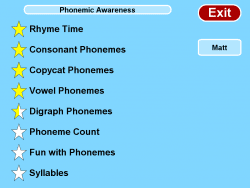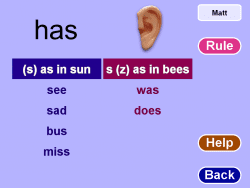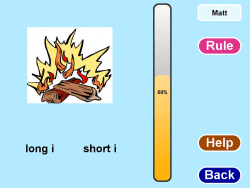Phonemic Awareness Activities
Developed by teachers and reading specialists, Essential Skills Phonemic Awareness program teaches students at a K-2 grade level 38 different phoneme sounds, how to isolate these sounds in words, phoneme addition, deletion, and substitution. The Essential Skills Phonemic Awareness program and phonological awareness activities build skills gradually and sequentially, ensuring mastery at each step. Crisp and clear pronunciation of letter sounds supports students as they work through more than 200 phonemic awareness activities. Essential Skills Phonemic Awareness activities are the best computer-based program available for teaching phonemic awareness skills.
Targeted Skills in Phonemic and Phonological Awareness
- Rhyming
- Digraph Phonemes
- Copycat Phonemes
- Vowel Phonemes
- Phoneme Counting
- Phoneme Manipulation
- Syllables
Highlighted Features
- Developed by teachers and reading specialists
- Includes more than 200 activities for teaching phonemic awareness
- Features unique activities to teach auditory discrimination
- Word family activities teach the concept of rhyming words
- Teaches long and short vowel sounds including sounds of “y”
- Audio-visual presentation of phonemic awareness rules include click-and-hear examples
- Engaging phonemic awareness activities motivate all types of learners
Resources
Phonemic Awareness Assessment
Each Essential Skills program offers a diagnostic phonemic awareness assessment, guaranteeing a personalized learning path for every learner. The Phonemic Awareness assessment evaluates students’ identification of 38 distinct phoneme sounds, encompassing both long and short vowel sounds, as well as the sounds of “y”.
The Best Value in K–6 Learning
Access the full Essential Skills library — all subjects, all grade levels — for one simple price per class or school. Discover why thousands of educators trust our research-based programs to build foundational skills and boost student success.
See Our PricingSee measurable student gains — or your money back.
We stand behind our programs. If your students don’t show measurable progress in 6 months, we’ll refund your subscription — no questions asked.
Just use the program 2–3 times per week for 20–30 minutes per session, and track progress using our built-in reports.
We believe in results, and we’re putting that belief in writing.

What are some examples of phonological awareness activities for young learners?
Examples of phonological awareness activities for young learners include:
Rhyming games: Asking students to find words that rhyme or generate their own rhyming words.
Clapping syllables: Clapping out the syllables in words (e.g., clap three times for “el-e-phant”).
Alliteration practice: Finding words that begin with the same sound (e.g., “Silly snakes slither swiftly”).
Blending sounds: Providing sounds like /b/ /a/ /t/ and asking students to blend them into a word (“bat”).
Can phonemic awareness assessments be used with older students?
Yes, phonemic awareness assessments can be used with older students, particularly those who struggle with reading. For these students, the assessment can help identify lingering gaps in phonemic awareness, which may be contributing to difficulties with decoding and fluency.
What are some examples of phonemic awareness activities for kindergarten?
Some effective phonemic awareness activities for kindergarten include:
Sound matching: Asking students to identify objects or pictures that begin with the same sound.
Blending sounds: Providing students with individual sounds (e.g., /b/, /a/, /t/) and asking them to blend the sounds to make a word (“bat”).
Rhyming games: Encouraging students to find words that rhyme or identify rhyming pairs.
Sound isolation: Asking students to identify the first or last sound in a word (e.g., “What is the first sound in ‘dog’?”).
Why are phonemic awareness strategies important in early literacy?
Phonemic awareness strategies are important because they develop the ability to hear, identify, and work with the sounds in spoken language. This is a critical step in learning to read and write. With strong phonemic awareness, students may improve with decoding and spelling, which impacts overall literacy development.
What age group benefits most from a phonemic awareness program?
A phonemic awareness program is most beneficial for preschoolers, kindergarteners, and early elementary students (grades K-2). These are the critical years for developing the auditory skills needed to understand how sounds and letters relate to one another, which leads to successful reading and spelling later on.


